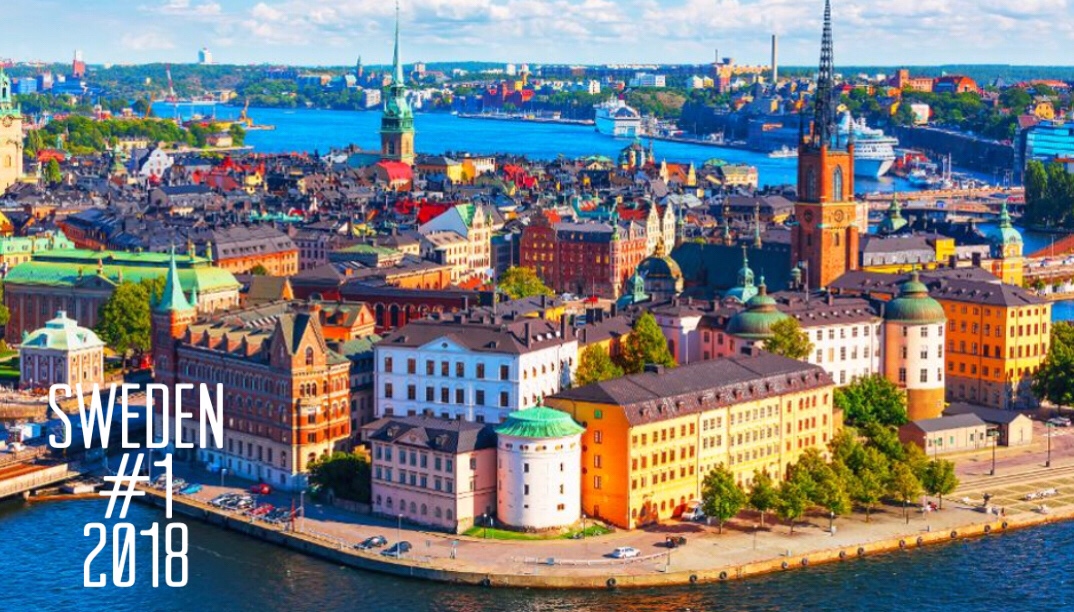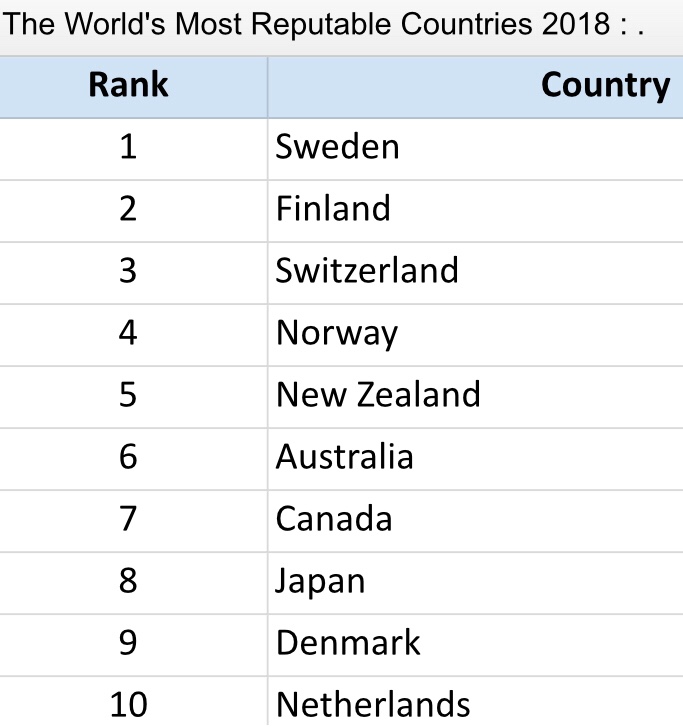The World’s Most Reputable Countries 2018
The global business community has been in a reputation freefall for the past couple of years, with trust in corporations experiencing the most significant regression since the end of the Great Recession. Not only has this crisis of confidence rattled some of the world’s largest companies and the leaders who sit at their helms, but countries are feeling the effect too.

“People are expecting more and more from companies and countries, in terms of solving the challenges we’re seeing around the world, and they’re being let down,” says Nicolas Georges Trad, executive partner at the Reputation Institute, a reputation measurement and management services firm. Since 2008, the institute has published the Country RepTalk, an annual study of nations’ reputations. This year’s ranking revealed an average one-point decline in the reputation of Country RepTrak nations.
“There’s been a lot of disruption in the world in the last 18 to 24 months,” adds Stephen Hahn-Griffiths, the institute’s chief reputation officer. “It really adds up to a lingering feeling of uncertainty in the world at the intersection of geopolitical tension, nationalism and underlying social unrest.”

To determine the Country RepTrak, the institute surveyed more than 58,000 individuals in Canada, France, Germany, Italy, Japan, Russia, the United Kingdom and the United States during the period from March to April 2018. The 55 countries considered were those with the greatest gross domestic product and familiarity with at least 51% of the G8 general population.
While financial stability has always influenced reputation, just two of the world’s top economies secured spots in the Country RepTrak’s top 10, with Canada falling from first place to No. 7 and Japan rising four spots to No. 8. And a country’s size doesn’t seem to matter either: None of the most populous nations and only two of the geographically largest—Australia (No. 6) and Canada—managed to break into the upper echelon. Instead, characteristics such as beautiful landscapes, friendly citizens and ethical policies are driving nations’ reputations. “A new and significant trend that is emerging is altruistic happiness,” says Hahn-Griffiths. “The countries that rise to the top of the rankings are the ones that allow you to fulfill the pursuit of happiness.”
One example of this new trend is Sweden, which climbed two spots to No. 1, with a score of 81.7. The Scandinavian nation is no stranger to the top ranks of the Country RepTrak, having claimed the top position for the first time in 2016. Its excellent reputation can, in part, be credited to its decades of sustainability initiatives, dating back to 1967, when Sweden became the world’s first country to form an environmental protection agency. Since then, green living has been a priority, and it looks to be paying off: Today, more than 99% of all waste is recycled and 52% of energy production is generated by renewable resources. Globally, Sweden accounts for less than 0.2% of all greenhouse gas emission.
Sweden has also become synonymous with hospitality. The country of 10 million has a long history of embracing the displaced, most recently opening its borders to 163,000 refugees of the Syrian Civil War—more per capita than any other European nation. “Uncertainty is making countries focus more inward than outward,” says Georges Trad, pointing to countries like the United States as an example of this. At No. 34, the U.S. has barely recovered from last year’s 10-spot dive to No. 38, the result of President Trump’s election and of anti-immigration rhetoric. “Closing borders is not looked upon favorably.”
Just as the Swedes have welcomed immigrants, they have also supported the LG TQ community—legalizing same-sex marriage in 2009 and adding sexual orientation discrimination protections to its constitution in 2011—and women. Sweden has never ranked lower than fifth place on the World Economic Forum’s Global Gender Gap Report report, and it was the first country to replace maternity leave with parential leave (in 1974). Its paid-leave policy is one of the world’s most generous, offering parents 480 days of leave up until a child’s eighth birthday. While the country still has work to do—Swedish women make just 88 cents for every dollar banked by their male counterparts—the government is transparent about its shortcomings, openly reporting on the stetae of gender equality.
The Swedish way of life is really aligned with the pursuit of happiness,
“The Swedish way of life is really aligned with the pursuit of happiness,” says Hahn-Griffiths. “But it didn’t just happen by chance.”
Sweden ranks only a few tenths of a point above Finland (No. 2) and Norway (No. 4), neighboring Nordic nations with their own progressive policies, and it is interesting to consider the reasons for this. It all comes down to compelling storytelling, according to Stephen Hahn-Griffiths. “The challenge for countries, as opposed to corporations, is there are many voices,” he says, “different groups communicating narratives that might not align. What Sweden has done is develop one narrative that everyone speaks from.”
The narrative, called “Sharing Sweden,” is outlined in a 12-page manual, produced and promoted by a public agency called the Swedish Institute. The strategy speaks to “core values” and “target groups,” not unlike a business plan. “Reputation has to do with creating a balance between reality and perception,” notes Georges Trad.
The 29 nations with declining reputations would do well to take note of Sweden’s narrative strategy. Take Russia, for instance, which dropped one spot to No. 52. “St. Petersburg is beautiful, but that’s not the image that comes to mind when you think of Russia. It’s Putin and a country that’s flexing its economic muscles. That beauty is not being communicated by the country, the media or the general public,” says Hahn-Griffiths. “That sense of happiness and altruism is what matters in defining a country’s reputation.”
Source: Forbes
You must be logged in to post a comment.